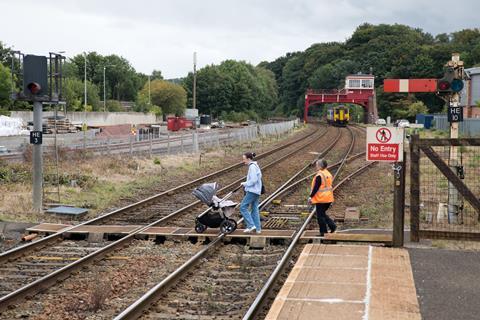
UK: In what appears to be a rushed decision, the formal consultation on the proposals to close most station ticket offices in England has been extended by 5½ weeks to September 1.
Details emerged early on July 26, the last day of the original consultation period, when Network Rail Chairman Sir Peter Hendy told the BBC that he had been informed of the decision.
A formal statement was provided later in the morning, when the Rail Delivery Group said ‘in increasing the time available, train operators are listening to feedback and hope that more people will have the opportunity to have their say in to changes to how tickets are sold at stations’.
Rail Business UK understands that an extension was approved by the government on July 25 along with an instruction to train operators, later rescinded, that they were not to issue press releases.
Industry sources have indicated to Rail Business UK that there was an expectation that legal challenges would delay the closure process at some operators, and an industry-wide delay will ensure that the process remains aligned across all operators.
Noting that the RDG statement included the comment ‘although local plans vary…’, an industry source speaking on condition of anonymity said that although the correct procedures were being followed, some operators had not made material available in accessible formats, particularly for people with visual impairments, and this could have been enough for a legal challenge to succeed. Because of this, the industry has decided to extend the consultation across all operators to avoid reviews based on ‘technicalities’.
The source said there is a feeling of chaos within the industry over the undue haste placed on the process by the Department for Transport. One insider said the proposal ‘could have been rolled out more carefully by the government in the first place’.
Legal challenges

Some of the legal challenges are being directed at the four operators being operated by the government’s operator of last resort; Leigh Day Law has sent a letter before action to the Transport Secretary as well as to LNER, Northern, TransPennine Express and Southeastern, challenging the the consultation process .
Legal experts have noted that as a point of law it is not currently possible to challenge to the plan to close ticket offices. This is because the proposal is at the consultation stage, and it is not legally possible to have a judicial review of a decision a minister has not yet formally taken.
If legal challenges do go ahead once the final plans are agreed by ministers, these will have to be undertaken on an operator-by-operator basis, as there is no industry-wide body to take action against.
Meanwhile, some operators have delivered proposals exceeding the scope expected by ministers, particularly on the issue of support for passengers with disabilities.
Noting that Secretary of State Mark Harper had made a clear commitment that all stations that currently have staff would continue to have staff available, one insider noted that ‘he of course didn’t say whether that would be on a full-time, part-time or mobile basis’.
There are particular concerns over stations where passengers need staff support to access some platforms, such as via flat ‘barrow crossings’ over the tracks. At least one operator has suggested that mobile teams would be an adequate way of dealing with these cases, a decision which has caused surprise even amongst those supporting the overall plan.
One person familiar with the consultation process told Rail Business UK that this would be acceptable within guidance received from the government, which explicitly included mobile members of staff. ‘This point may not have been understood by the Secretary of State, so whilst it is a misguided and poorly thought through decision by the operator, it is not non-compliant’, they added. The Secretary of State is reported to have ‘made it clear that those plans were not acceptable and they would not get through the consultation’.
Worst case scenario
Insiders continue to say that the industry has put forward a worst-case scenario for ticket office closures in the expectation that the results of the consultation would allow plans to be scaled back.
One source noted ‘the proposals have been designed to generate maximum savings for government in the hope that the consultation will give train companies a sensible, independent way of pushing back against policymakers’.
Meanwhile, sources at the Rail Delivery Group have denied suggestions by the RMT trade union that around 2 000 redundancies could occur as a result of the retail reforms, although some job losses are nevertheless seen as likely.
‘I don’t think anybody has announced any redundancies; letters have gone to RMT representatives to invite them to collective bargaining sessions that are designed to reduce the need for compulsory redundancies, but there is no guarantee that there won’t be any. We do want there to be a job for everybody that wants one’, says one insider.
Another aspect that continues to generate concern is the legal requirement for operators to provide passengers with the ‘best value’ ticket for their journey, and the inability of some ticket vending machines to sell the full range of tickets.
RDG has stated that ‘overall the proposals aim to bring staff out from behind ticket office windows to provide more support for customers buying tickets and navigating stations, as they move in to new, multi-skilled customer host roles’. However, Chief Executive Jacqueline Starr has been unable to guarantee that TVMs will offer every available ticket and that the best value commitment would be maintained in all cases.



